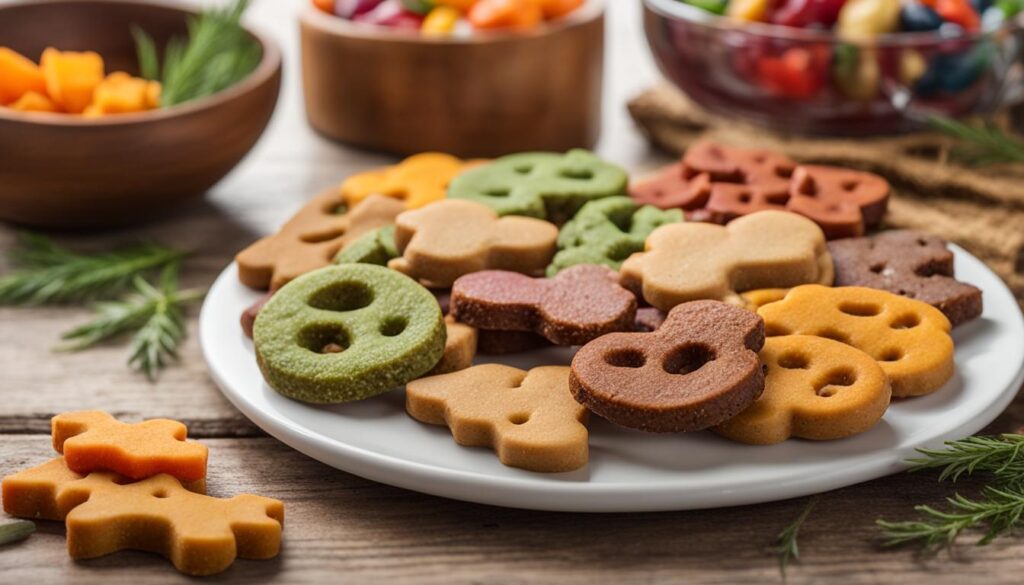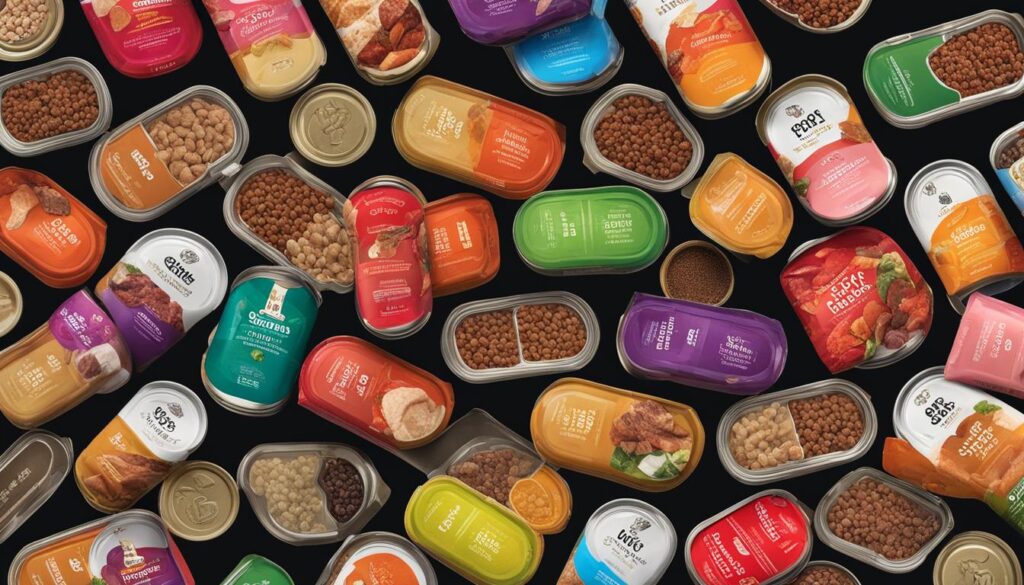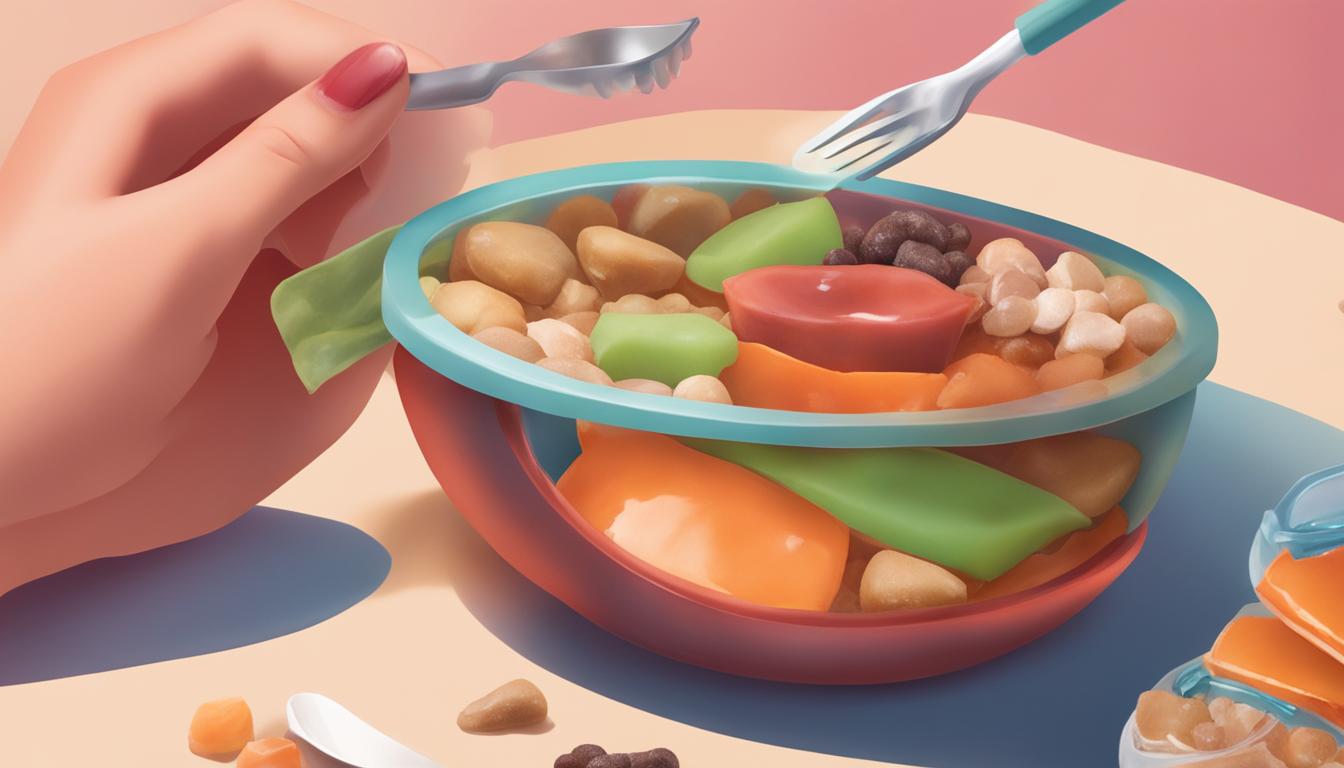As our furry friends age, they can develop dental issues that make it difficult or impossible to eat their regular food. This can be a significant problem, as old dogs need to eat enough to stay healthy. Fortunately, there are ways to ensure your old dog eats appropriately and stays healthy. In this guide, we’ll explore ways to help your senior dog get the nutrition they need, even if they have problems with their teeth.
Key Takeaways:
- Choose soft dog foods that are specifically designed for dogs with dental issues.
- Grind dry kibble into smaller pieces and soften them with warm water or broth.
- Consider incorporating wet food into your dog’s diet, as it is softer and easier to eat.
- Consult with your veterinarian to ensure your dog is getting the necessary nutrients.
- Incorporate dental care into your dog’s diet, such as dental chews or treats.
The Importance of Diet for Older Dogs with Dental Issues
As your dog enters their golden years, it’s crucial to prioritize their diet, especially if they have dental issues. Aging can affect various aspects of your dog’s health, including their teeth and digestion. Many senior dogs experience tooth loss, making it difficult for them to chew hard food. Additionally, older dogs often have sensitive stomachs and may struggle with digesting high-fat or high-fiber foods. Therefore, choosing the right diet for your senior dog is essential for their overall well-being and oral health.
There are several options available when it comes to providing easy-to-chew meals for your aging dog. Soft dog food recipes are a popular choice as they offer a texture that is easier for your dog to consume. These recipes often include ingredients that are gentle on the teeth and stomach, ensuring your furry friend can enjoy their meals without discomfort. Soft dog food brands specifically designed for dental health diets can also be beneficial, as they provide the necessary nutrients while being gentle on your dog’s mouth.
Evaluating your dog’s specific needs is key when selecting the right soft diet. If your dog has lost all of their teeth, wet food can be an excellent option as it requires minimal chewing. You can also consider grinding dry kibble into smaller pieces and softening them with warm water or broth. Homemade meals, such as soups or stews, can be easily mashed or pureed to provide a soft texture that is gentle on your dog’s dental health. However, it’s crucial to consult with your veterinarian to ensure that the chosen soft diet meets your dog’s nutritional requirements.
“Choosing a soft diet for your senior dog with dental issues can significantly improve their quality of life. It’s essential to provide them with meals that are easy to chew and digest, ensuring they receive the necessary nutrition while maintaining their oral health.”
Table: Soft Dog Food Options for Older Dogs with Dental Issues
| Brand | Features | Recommended for |
|---|---|---|
| Brand A | Soft texture, specifically designed for dental health | Dogs with tooth loss or gum disease |
| Brand B | Easy-to-chew, high-quality ingredients | Sensitive stomachs or dogs with limited chewing ability |
| Brand C | Pureed or mashed meals, suitable for dogs with no teeth | Dogs with severe dental issues or tooth loss |
Choosing the right soft diet for your dog is a vital step in ensuring their health and well-being. When selecting soft dog food brands, opt for those that are high in quality and low in preservatives. Take into consideration your dog’s specific needs, such as managing gum disease or maintaining a healthy weight. Your veterinarian can provide valuable guidance in choosing the most suitable soft food options for your older dog. Additionally, incorporating dental care into their diet, such as dental chews or treats, can complement their oral health regimen and contribute to overall dental wellness.
By providing a suitable soft diet and prioritizing dental care, you can help your senior dog continue to thrive, even with dental issues. Remember to consult with your veterinarian for personalized advice and recommendations based on your dog’s unique needs. With the right diet and proper care, you can ensure that your furry friend enjoys their meals while maintaining their oral health.

Table: Nutritional Soft Dog Foods Comparison
| Brand | Soft Dog Food Variant | Key Features |
|---|---|---|
| Brand A | Soft & Savory Stew | Real meat, rich in protein, added vitamins and minerals |
| Brand B | Delicate Morsels in Sauce | Soft texture, easily digestible, balanced nutrition |
| Brand C | Pate with Chicken and Vegetables | Smooth consistency, gradual transition into softer diet |
When feeding a dog with no teeth, it’s crucial to ensure their soft food options are nutritionally balanced. Consult with your veterinarian to determine the appropriate portion size and feeding frequency based on your dog’s age, weight, and overall health. Regular dental check-ups are also important to monitor the condition of your dog’s gums and ensure their oral health is maintained. With the right soft food options and proper care, you can provide a comfortable and nutritious diet for your dog, even without teeth.
Choosing the Right Soft Diet for Your Dog
When it comes to selecting a soft diet for your dog with dental issues, there are a few key factors to consider. First and foremost, opt for soft dog food brands that prioritize high quality ingredients and avoid preservatives. Look for brands specifically designed for older dogs with dental issues, as they tend to have softer textures that are easier for your furry friend to chew and digest. Remember, maintaining a healthy diet is vital for their overall well-being.
Your dog’s specific needs should also be taken into account when choosing their soft diet. If they are struggling with gum disease, for example, look for diets that promote healthy gums and teeth. These diets may contain ingredients such as antioxidants or special enzymes that help manage gum disease and maintain oral health. Another consideration is weight management, as many senior dogs may be prone to weight gain. Opt for diets that are formulated to support a healthy weight while still providing the necessary nutrients.
Consulting with your veterinarian is crucial in determining the right soft diet for your dog. They will be able to assess your dog’s individual needs and make recommendations based on their health and medical history. Additionally, they will ensure that the chosen diet is nutritionally balanced and meets your dog’s specific dietary requirements. Regular check-ups with your veterinarian will also allow for any adjustments to be made as your dog’s health changes over time.
| Important Considerations for Choosing a Soft Diet | Soft Dog Food Brands | Managing Gum Disease with Diet |
|---|---|---|
| High-quality ingredients | Brand A | Brand B |
| Avoidance of preservatives | Brand C | Brand D |
| Soft texture for easy chewing and digestion | Brand E | Brand F |
| Promotes healthy gums and teeth | Brand G | Brand H |
| Supports weight management | Brand I | Brand J |
Incorporating dental care into their diet is also important for maintaining your dog’s oral health. Dental chews or treats can help reduce plaque and tartar buildup, keeping their teeth and gums healthy. However, it’s essential to choose dental chews and treats that are specifically designed for dogs with dental issues, as they are softer and more gentle on their teeth and gums.
By carefully selecting the right soft diet for your dog and incorporating dental care into their routine, you can help them thrive even with dental issues. Remember to consult with your veterinarian for personalized recommendations and to ensure that your dog is getting the necessary nutrition for their specific needs. With proper care and attention, you can keep your dog happy and healthy for years to come.

Conclusion
Feeding a dog with dental issues can be a challenge, but don’t worry, there are plenty of soft food solutions available to ensure your furry friend gets the nutrition they need while maintaining their oral health.
First and foremost, consider choosing soft dog food brands that are specially formulated for older dogs with dental issues. These brands provide a soft texture that is easier for your pup to chew and digest. By opting for high-quality brands that are low in preservatives, you can ensure your dog receives the best possible nutrition.
In addition to commercial options, you can also explore homemade meals for your senior dog. Soups and stews can be mashed or pureed to create a soft texture that is gentle on their teeth. Just make sure to consult with your veterinarian to ensure the meals provide all the necessary nutrients.
Remember, managing gum disease with diet is essential for your dog’s oral health. Incorporating dental chews or treats into their diet can help maintain their gum health and prevent further dental issues. Regular check-ups with your vet will also ensure you’re on the right track and provide guidance on any necessary adjustments to your dog’s soft diet.
FAQ
Can I still feed my dog dry kibble if they have dental issues?
Yes, you can grind dry kibble into smaller pieces and soften them with warm water or broth to make it easier for your dog to eat.
Is wet food a good option for dogs with dental issues?
Yes, wet food is softer and easier to eat than dry food, making it a great choice for dogs with dental issues.
Can I make homemade meals for my dog with dental issues?
Absolutely! Homemade meals such as soups and stews can be easily mashed or pureed to provide a soft texture for your dog to eat.
What should I look for when choosing a soft diet for my dog with dental issues?
Look for soft dog food brands that are high in quality and low in preservatives. Consider your dog’s specific needs, such as gum disease management or maintaining a healthy weight.
Should I consult with my veterinarian before choosing a soft diet for my dog?
Yes, it’s always a good idea to consult with your veterinarian to ensure you are choosing the right soft food that meets your dog’s individual needs.
How can I incorporate dental care into my dog’s diet?
You can incorporate dental chews or treats into your dog’s diet to help maintain their oral health while they enjoy their soft food.
Feeding a dog with dental issues can be a challenge, but is it possible to provide them with the necessary nutrition?
Absolutely! By choosing the right soft diet, incorporating homemade meals, and consulting with your veterinarian, you can create a diet plan that meets your dog’s specific needs and ensures they receive the necessary nutrition.
Can dogs with dental issues still thrive?
With proper care, attention, and a suitable diet, dogs with dental issues can still thrive and lead a healthy and happy life.





